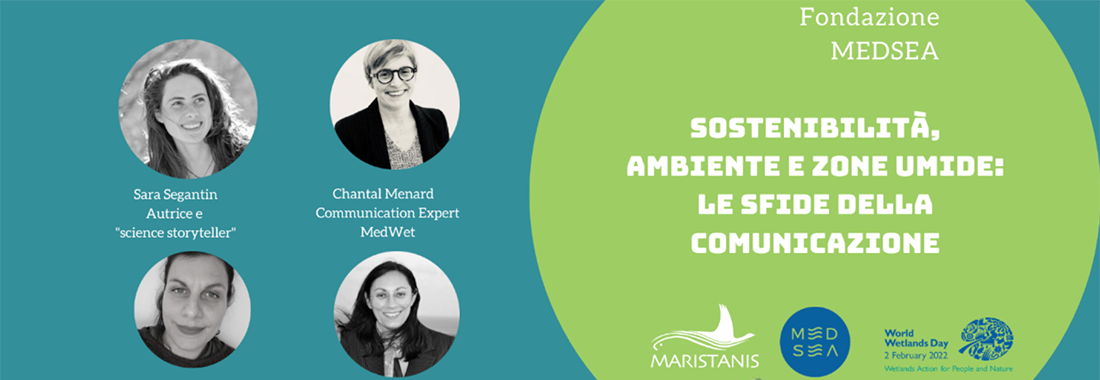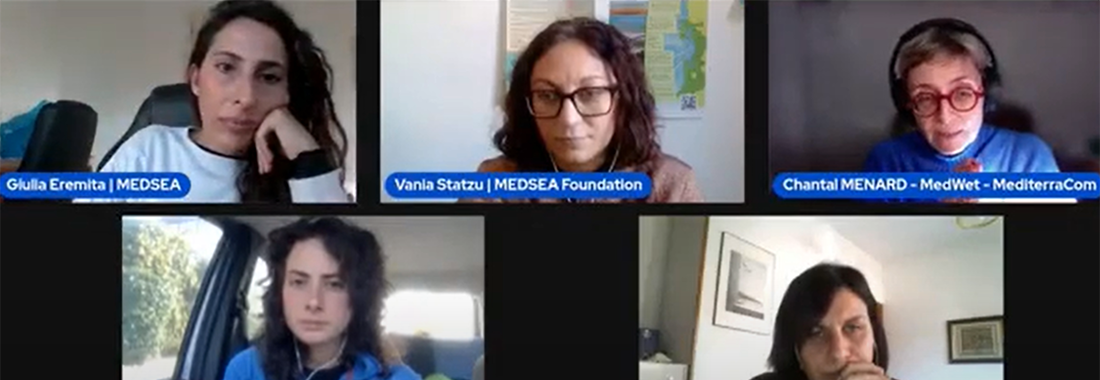Communication is an increasingly essential means to bring out the ongoing environmental challenges and their solutions, but sometimes it doesn’t seem to be effective and it may causes confusion. In the information industry 2.0, anyone can publish anything, an infinity of data that is not always possible to verify. Sometimes some environmental challenges seem more or less far away from people, depending on the wave of information of the moment and the way these are perceived. Yet today, compared to the past, we touch these issues in our daily lives and the public seems more attentive and informed.
The topic was explored in the online webinar on "Sustainability, environment and wetlands: the challenges of Communication" which took place on the MEDSEA facebook page on the occasion of the program of events for the world wetlands day. Vania Statzu (environmental economist and MEDSEA vice president), Chantal Menard (MedWet communication expert), Sara Segantin (author, scientific storyteller and MEDSEA ambassador) and Matilde Schirru (researcher at IBE-CNR) took part.
The online webinar with the experts in scientific communication has gone through three main questions: how has the environmental communication changed in recent decades, what are the current challenges and how to improve the effectiveness of delivering the messages.
For Vania Statzu, the turning point of environmental communication, from scientific and niche audience to the mass, occurred in Italy with the Paris Agreement in 2016 when measures in climate change started to be introduced and discussed in national policies. "Environmental issues become topical when they are integrated with social and economic aspects, those that concern us most closely, passing from a niche topic among academics to vigorous social debate", explains the environmental economist from the MEDSEA Foundation. For Chantal Menard, expert in environmental communication, "today we are plenty of tools and possibilities to distribute the environmental topics in an exceptional way, we no longer need to reach the public or undertake long life learning with them with continuous training, in which they remain completely passive. The changes are palpable in our daily life, the press is informed and well prepared on these matters”. However, explains Menard, “we need education for sustainable development that actively involves people, from large companies to individual citizens”.
Thus, the message of the climate crisis gradually turned into a strong and clear imperative, an invitation to actively participate in the process of change and improve our habits. Now more than ever it is necessary to optimize the relationship between communication and the environment to acquire concrete feedback.
“We hear about climate change every day - explains Sara Segantin - from newspapers, to social networks, to various events. Even if the news follows one another in a chaos of information, where all is on the same level, the message is clear and persistent. Yet, people still don't feel part of the decision-making process. But raising awareness also means instilling a sense of responsibility. Therefore, the challenges that communication will have to face in this decade are many and aim to verify the position of people, therefore how much environmental communication has an impact on single individuals (for example on their behaviors)".
WHICH SOLUTIONS FOR A MORE EFFECTIVE ENVIRONMENTAL COMMUNICATION?
Often journalists, who represent the link between researchers and the audience, have neither the training nor the time to address the environmental issue at 360 degrees. At the same time, scientists are unable to translate into simple words such complicated arguments which, in themselves, appear to be "bigger than us".
In this regard, several solutions came up from the MEDSEA conference:
1 - Training courses for academics to better communicate scientific data to a diverse audience. It would also be very useful with a view to integrating the theme of the environment not only in teaching activities but in all school disciplines.
2 - Stop talking about climate change in a "terrorist" key and talk about solutions, which often "they exist, but they are unknown nor implemented". Talking “with people for people” by sharing direct experiences in the field and the positive results already achieved. “All of this helps to make the problem more tangible” – says Menard.
3- Another important aspect are the premises. Asking oneself the right questions helps to reconstruct a history of the problem to understand the premises that caused it. “But it is useless if we remain convinced that these premises do not exist or cannot be changed, - explains Segantin - because we risk to go back to the starting point.
4 - Finally, an education to uncertainty is equally important, "that is, to accustom people to what researchers have foreseen and, above all, to correctly orient their behavior towards the future", adds Schirru.
5 – Last but not least, communication and the environment must go hand in hand. We must not get lost in the complexity of the message, but find ourselves, recover our relationship with nature and regain confidence in science. Strong communication is the key to social change.
Latest news

A Forest for Bees Takes Root in Sardinia: Restoring Nature, Supporting Pollinators
The planting operations for the first Forest for Bees installation—a forest for bees—have been completed in Sennariolo (OR). This is a special one-hectare forest dedicated to bees and pollinators, essential insects for food…

MEDSEA Launches the Wetland4Change Project in Terralba to test and validate climate change's solutions
On Friday, March 14, 2025, in the council chamber of Terralba, MEDSEA held a meeting with the Municipality of Terralba to officially introduce Wetland4Change to stakeholders (productive activities, as well as institutional…

In Crete with ARTEMIS to protect seagrass meadows: 2nd Consortium Meeting
From March 4th to 6th, 2025, Heraklion (Crete) hosted the mid-term meeting of the ARTEMIS Interreg Euro-MED Natural Heritage project, organized by the Hellenic Marine Research Centre. This was a crucial moment to…

MEDSEA Heads to Tallinn for the Blue4All Consortium Meeting
Last January, the Blue4All project team gathered in Tallinn for the Consortium Meeting, marking the project's halfway point. The event, hosted by the local partner Keskkonnaamet/Estonian Environmental Board and the University of Tartu, brought together all 22 project partners from across…

ImPelaghiamoci: A Year of Initiatives to Learn About and Protect Cetaceans with the Municipality of Sassari
Promoting greater knowledge of the resident cetaceans in the Pelagos Sanctuary*, a transboundary marine protected area encompassing France, Liguria, Tuscany, and Sardinia, to improve the protection and conservation of these species…

Reforestation Operations Resume in Montiferru: A Forest for Bees by MEDSEA
Reforestation efforts in Montiferru, led by MEDSEA, are back on track. Following the planting of the first 5 hectares of olive trees, holm oaks, and Mediterranean shrubs, the focus now shifts to melliferous plants to…

25 Events in Sardinia for World Wetlands Day
Wetlands such as ponds, lagoons, lakes, rivers, and peatlands form an endless world of aquatic ecosystems. In Sardinia, the call to explore these habitats is open this February with the Sardinian edition of World Wetlands Day.

COASTRUST: Launching Sustainable Coastal Management in Domus de Maria Sardinia
The activities of the COASTRUST project, funded by the European Interreg Euro-MED program, have officially begun in Sardinia. The initiative aims to promote shared environmental management in the Mediterranean's coastal areas, addressing anthropogenic pressures…

Join the World Wetlands Day Sardinia 2025 Calendar: register your Event by January, 22nd
World Wetlands Day is celebrated every year on February 2, marking the adoption of the Convention on Wetlands signed on February 2, 1971, in Ramsar, on the shores of the…

MEDSEA joins the Camargue Red Alert with the Mediterranean Alliance for Wetlands to save birdlife
The MEDSEA Foundation has officially joined 73 other international organizations in signing the Camargue Red Alert, a collective call to action to safeguard the Camargue wetlands in France.

Wetland4Change: MEDSEA in Valencia to Explore Natural Climate Solutions Through Wetlands
The MEDSEA team participated in the second Consortium meeting of the Wetland4Change project in Valencia from November 26 to 28, 2024. The meeting was organized by local project partners, the…

Malta’s First Posidonia Meadow Restoration Project Led by MEDSEA Foundation
Different islands, but similar issues for marine ecosystems, which are heavily threatened by unregulated anchoring from recreational boating and illegal trawling. In Malta, as in Sardinia, the damage is particularly…

We are all at 'Valencia'-like risk, and here’s why
Le recenti inondazioni a Valencia sono un esempio tangibile di come gli eventi estremi legati al cambiamento climatico stiano aumentando in frequenza, intensità e durata, colpendo duramente il Mediterraneo, un vero e proprio…

Monitoring of Posidonia oceanica Meadows Begins in the Marine Protected Area of Capo Testa Punta Falcone
The monitoring activities of the Posidonia oceanica meadows in the Marine Protected Area (MPA) of Capo Testa Punta Falcone, located in Santa Teresa Gallura, have officially begun. In recent days, the marine…

MEDSEA joined the 7th TransformAr Consortium Meeting in Exeter
In Late September, the seventh Consortium Meeting of TransformAr took place in Exeter in South West England, organised by the partner Westcountry Rivers Trust, who are coordinating the Nature Based solutions in the…

Architecture and Environment of Wetlands at Costa Produttiva, September 8-14 in Marceddì
From September 8 to 14, Marceddì (OR) hosted Costa Produttiva, a multidisciplinary workshop that combines research, innovation, and sustainability for the future of our coasts. Organized by the DICAAR of the…
- 1
- 2
- 3
- 4


